Motivational Theories for Employee Satisfaction in Tesco
VerifiedAdded on 2023/01/16
|6
|1397
|83
AI Summary
This report explores the importance of motivation and various motivational theories in achieving employee satisfaction and improving productivity in Tesco's new discount store 'Jack'. It discusses the application of Maslow's hierarchy of needs theory and Herzberg's two-factor theory in motivating employees. The report concludes that motivation is crucial for empowering employees and obtaining a competitive advantage.
Contribute Materials
Your contribution can guide someone’s learning journey. Share your
documents today.

TASK 3
Secure Best Marks with AI Grader
Need help grading? Try our AI Grader for instant feedback on your assignments.
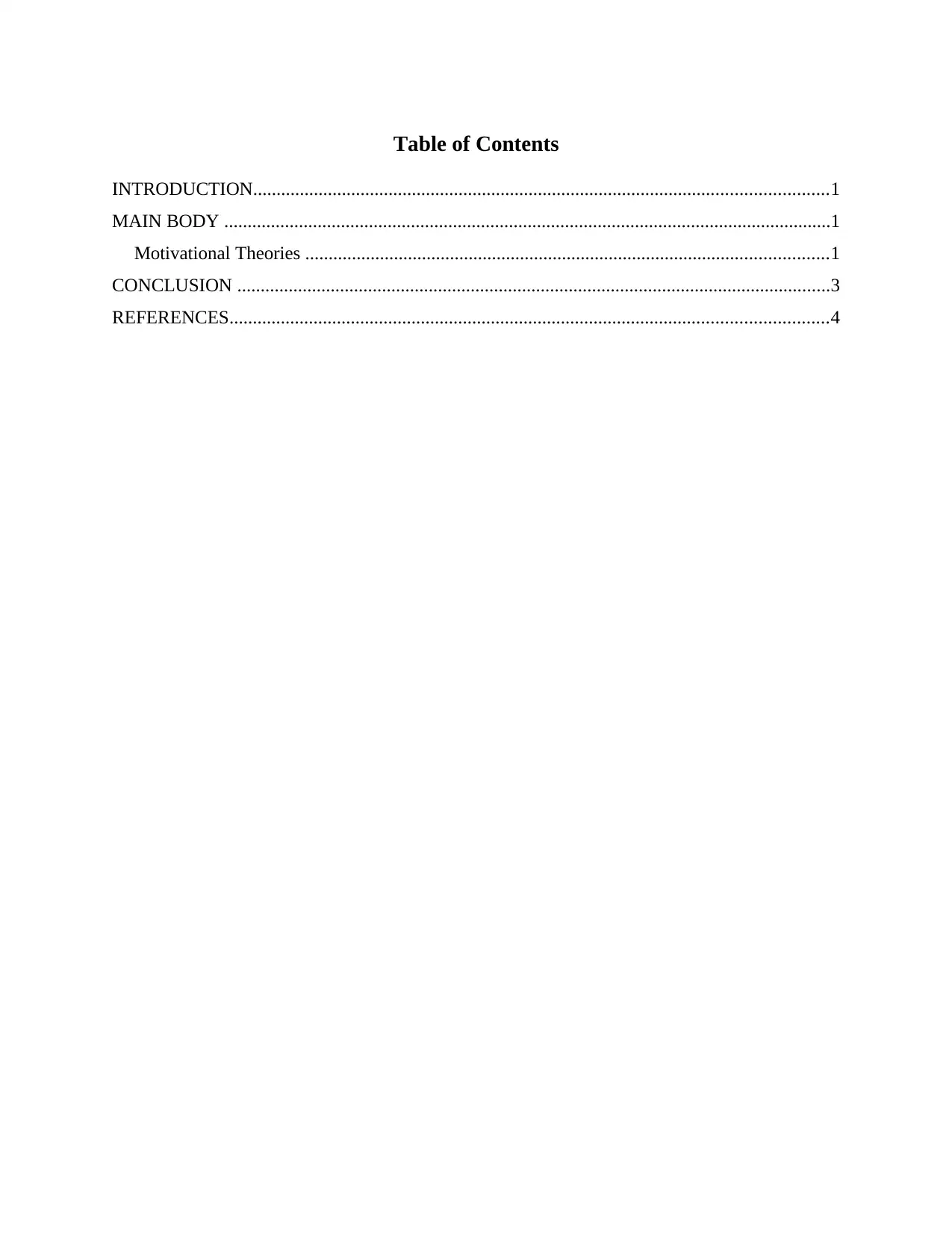
Table of Contents
INTRODUCTION...........................................................................................................................1
MAIN BODY ..................................................................................................................................1
Motivational Theories ................................................................................................................1
CONCLUSION ...............................................................................................................................3
REFERENCES................................................................................................................................4
INTRODUCTION...........................................................................................................................1
MAIN BODY ..................................................................................................................................1
Motivational Theories ................................................................................................................1
CONCLUSION ...............................................................................................................................3
REFERENCES................................................................................................................................4
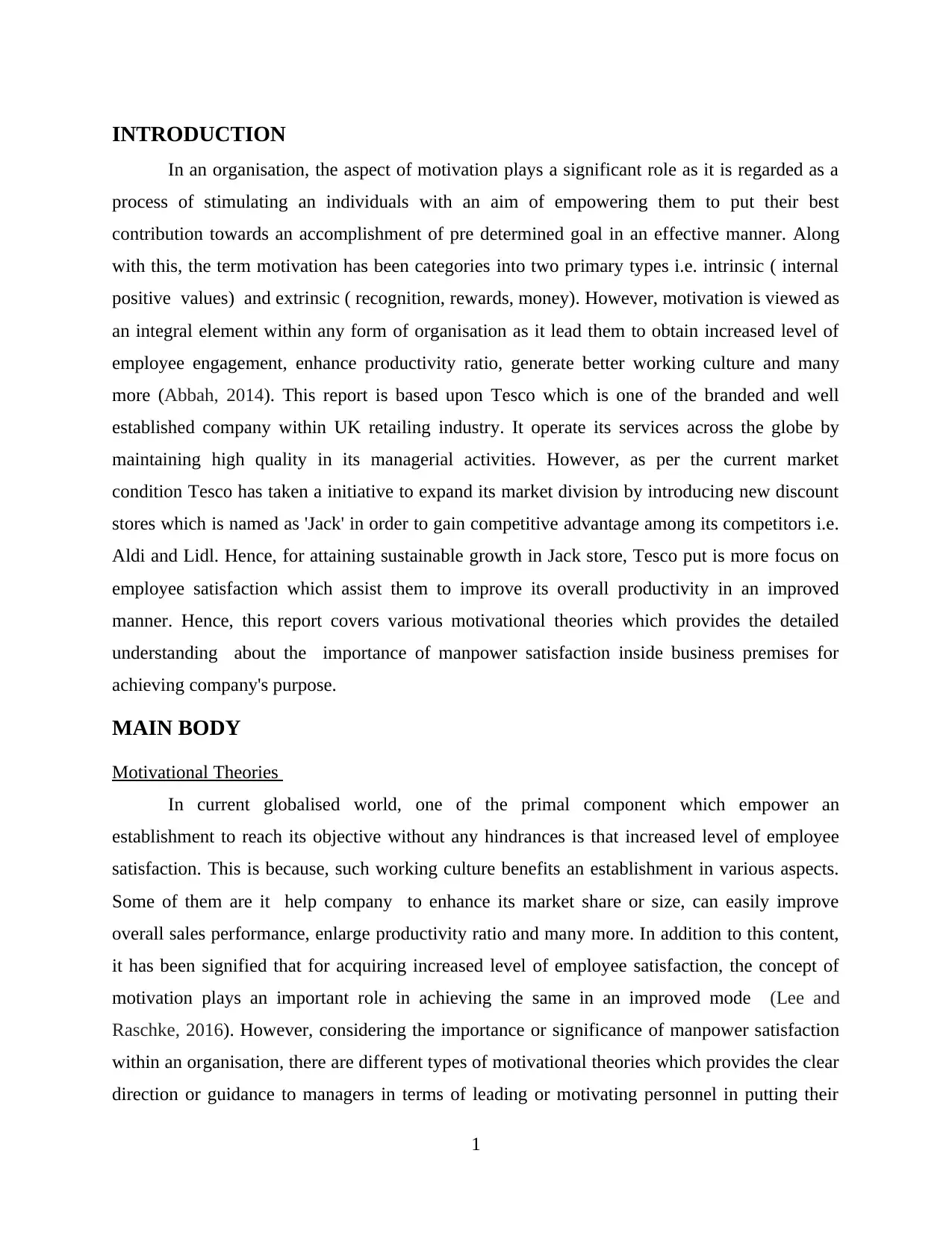
INTRODUCTION
In an organisation, the aspect of motivation plays a significant role as it is regarded as a
process of stimulating an individuals with an aim of empowering them to put their best
contribution towards an accomplishment of pre determined goal in an effective manner. Along
with this, the term motivation has been categories into two primary types i.e. intrinsic ( internal
positive values) and extrinsic ( recognition, rewards, money). However, motivation is viewed as
an integral element within any form of organisation as it lead them to obtain increased level of
employee engagement, enhance productivity ratio, generate better working culture and many
more (Abbah, 2014). This report is based upon Tesco which is one of the branded and well
established company within UK retailing industry. It operate its services across the globe by
maintaining high quality in its managerial activities. However, as per the current market
condition Tesco has taken a initiative to expand its market division by introducing new discount
stores which is named as 'Jack' in order to gain competitive advantage among its competitors i.e.
Aldi and Lidl. Hence, for attaining sustainable growth in Jack store, Tesco put is more focus on
employee satisfaction which assist them to improve its overall productivity in an improved
manner. Hence, this report covers various motivational theories which provides the detailed
understanding about the importance of manpower satisfaction inside business premises for
achieving company's purpose.
MAIN BODY
Motivational Theories
In current globalised world, one of the primal component which empower an
establishment to reach its objective without any hindrances is that increased level of employee
satisfaction. This is because, such working culture benefits an establishment in various aspects.
Some of them are it help company to enhance its market share or size, can easily improve
overall sales performance, enlarge productivity ratio and many more. In addition to this content,
it has been signified that for acquiring increased level of employee satisfaction, the concept of
motivation plays an important role in achieving the same in an improved mode (Lee and
Raschke, 2016). However, considering the importance or significance of manpower satisfaction
within an organisation, there are different types of motivational theories which provides the clear
direction or guidance to managers in terms of leading or motivating personnel in putting their
1
In an organisation, the aspect of motivation plays a significant role as it is regarded as a
process of stimulating an individuals with an aim of empowering them to put their best
contribution towards an accomplishment of pre determined goal in an effective manner. Along
with this, the term motivation has been categories into two primary types i.e. intrinsic ( internal
positive values) and extrinsic ( recognition, rewards, money). However, motivation is viewed as
an integral element within any form of organisation as it lead them to obtain increased level of
employee engagement, enhance productivity ratio, generate better working culture and many
more (Abbah, 2014). This report is based upon Tesco which is one of the branded and well
established company within UK retailing industry. It operate its services across the globe by
maintaining high quality in its managerial activities. However, as per the current market
condition Tesco has taken a initiative to expand its market division by introducing new discount
stores which is named as 'Jack' in order to gain competitive advantage among its competitors i.e.
Aldi and Lidl. Hence, for attaining sustainable growth in Jack store, Tesco put is more focus on
employee satisfaction which assist them to improve its overall productivity in an improved
manner. Hence, this report covers various motivational theories which provides the detailed
understanding about the importance of manpower satisfaction inside business premises for
achieving company's purpose.
MAIN BODY
Motivational Theories
In current globalised world, one of the primal component which empower an
establishment to reach its objective without any hindrances is that increased level of employee
satisfaction. This is because, such working culture benefits an establishment in various aspects.
Some of them are it help company to enhance its market share or size, can easily improve
overall sales performance, enlarge productivity ratio and many more. In addition to this content,
it has been signified that for acquiring increased level of employee satisfaction, the concept of
motivation plays an important role in achieving the same in an improved mode (Lee and
Raschke, 2016). However, considering the importance or significance of manpower satisfaction
within an organisation, there are different types of motivational theories which provides the clear
direction or guidance to managers in terms of leading or motivating personnel in putting their
1
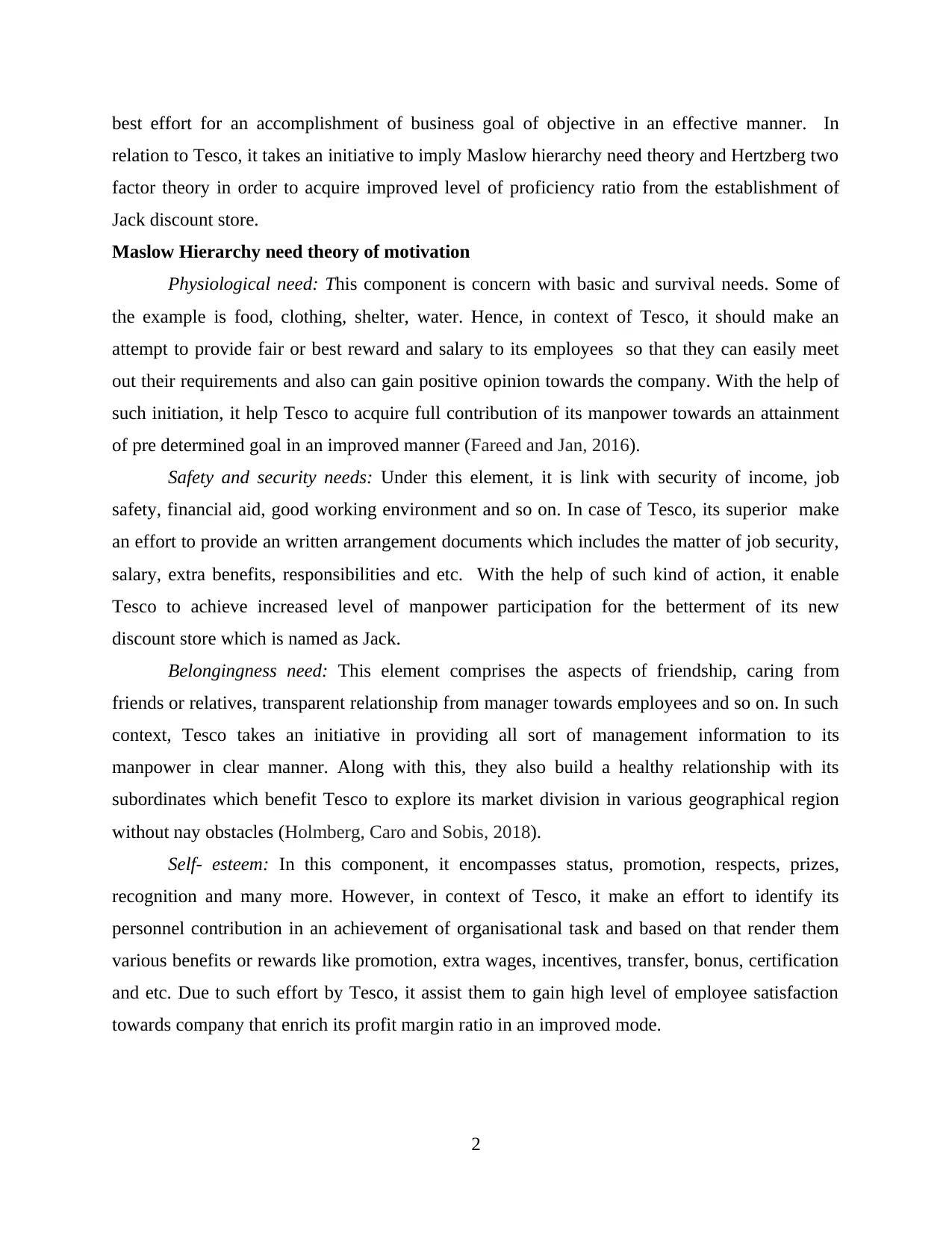
best effort for an accomplishment of business goal of objective in an effective manner. In
relation to Tesco, it takes an initiative to imply Maslow hierarchy need theory and Hertzberg two
factor theory in order to acquire improved level of proficiency ratio from the establishment of
Jack discount store.
Maslow Hierarchy need theory of motivation
Physiological need: This component is concern with basic and survival needs. Some of
the example is food, clothing, shelter, water. Hence, in context of Tesco, it should make an
attempt to provide fair or best reward and salary to its employees so that they can easily meet
out their requirements and also can gain positive opinion towards the company. With the help of
such initiation, it help Tesco to acquire full contribution of its manpower towards an attainment
of pre determined goal in an improved manner (Fareed and Jan, 2016).
Safety and security needs: Under this element, it is link with security of income, job
safety, financial aid, good working environment and so on. In case of Tesco, its superior make
an effort to provide an written arrangement documents which includes the matter of job security,
salary, extra benefits, responsibilities and etc. With the help of such kind of action, it enable
Tesco to achieve increased level of manpower participation for the betterment of its new
discount store which is named as Jack.
Belongingness need: This element comprises the aspects of friendship, caring from
friends or relatives, transparent relationship from manager towards employees and so on. In such
context, Tesco takes an initiative in providing all sort of management information to its
manpower in clear manner. Along with this, they also build a healthy relationship with its
subordinates which benefit Tesco to explore its market division in various geographical region
without nay obstacles (Holmberg, Caro and Sobis, 2018).
Self- esteem: In this component, it encompasses status, promotion, respects, prizes,
recognition and many more. However, in context of Tesco, it make an effort to identify its
personnel contribution in an achievement of organisational task and based on that render them
various benefits or rewards like promotion, extra wages, incentives, transfer, bonus, certification
and etc. Due to such effort by Tesco, it assist them to gain high level of employee satisfaction
towards company that enrich its profit margin ratio in an improved mode.
2
relation to Tesco, it takes an initiative to imply Maslow hierarchy need theory and Hertzberg two
factor theory in order to acquire improved level of proficiency ratio from the establishment of
Jack discount store.
Maslow Hierarchy need theory of motivation
Physiological need: This component is concern with basic and survival needs. Some of
the example is food, clothing, shelter, water. Hence, in context of Tesco, it should make an
attempt to provide fair or best reward and salary to its employees so that they can easily meet
out their requirements and also can gain positive opinion towards the company. With the help of
such initiation, it help Tesco to acquire full contribution of its manpower towards an attainment
of pre determined goal in an improved manner (Fareed and Jan, 2016).
Safety and security needs: Under this element, it is link with security of income, job
safety, financial aid, good working environment and so on. In case of Tesco, its superior make
an effort to provide an written arrangement documents which includes the matter of job security,
salary, extra benefits, responsibilities and etc. With the help of such kind of action, it enable
Tesco to achieve increased level of manpower participation for the betterment of its new
discount store which is named as Jack.
Belongingness need: This element comprises the aspects of friendship, caring from
friends or relatives, transparent relationship from manager towards employees and so on. In such
context, Tesco takes an initiative in providing all sort of management information to its
manpower in clear manner. Along with this, they also build a healthy relationship with its
subordinates which benefit Tesco to explore its market division in various geographical region
without nay obstacles (Holmberg, Caro and Sobis, 2018).
Self- esteem: In this component, it encompasses status, promotion, respects, prizes,
recognition and many more. However, in context of Tesco, it make an effort to identify its
personnel contribution in an achievement of organisational task and based on that render them
various benefits or rewards like promotion, extra wages, incentives, transfer, bonus, certification
and etc. Due to such effort by Tesco, it assist them to gain high level of employee satisfaction
towards company that enrich its profit margin ratio in an improved mode.
2
Secure Best Marks with AI Grader
Need help grading? Try our AI Grader for instant feedback on your assignments.
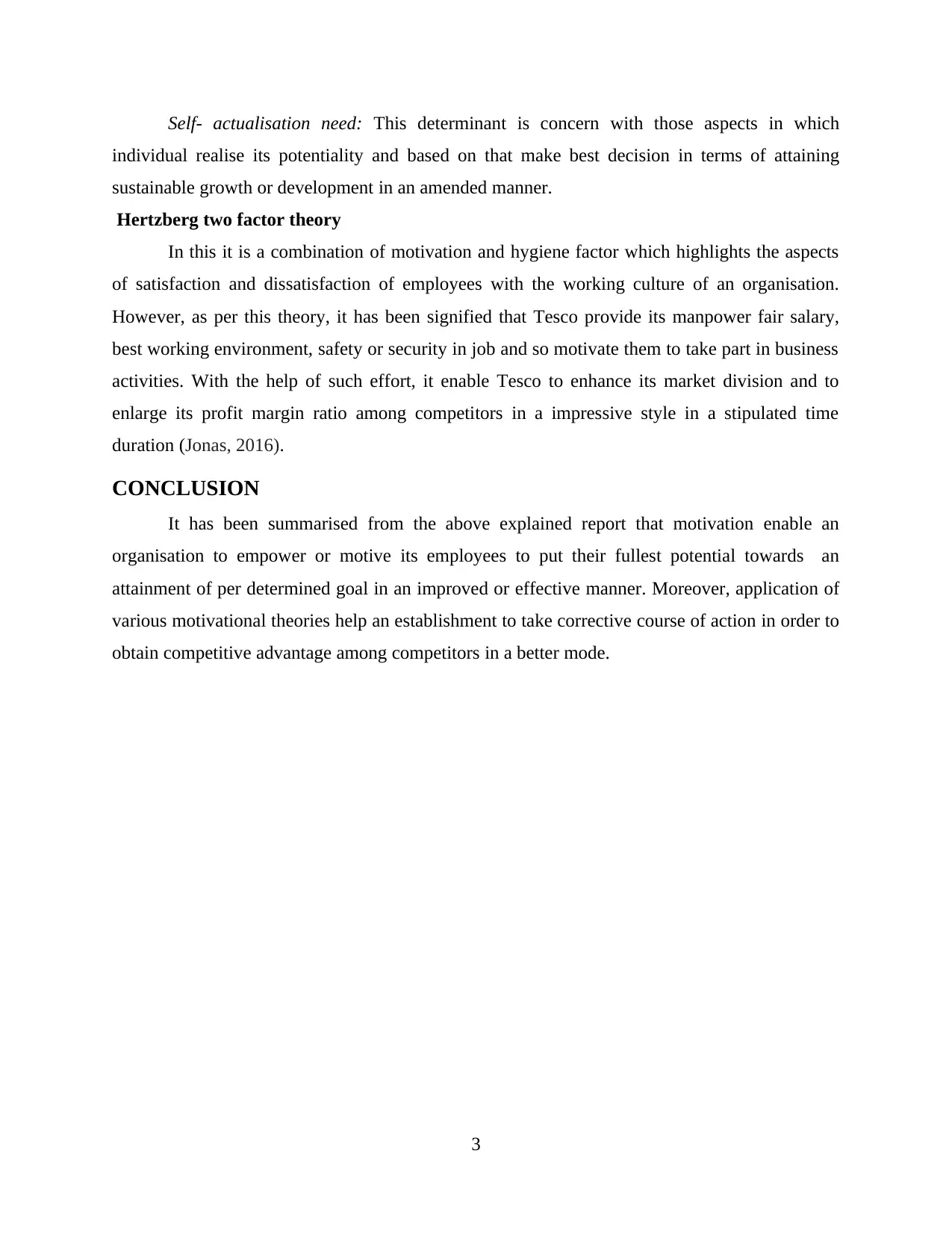
Self- actualisation need: This determinant is concern with those aspects in which
individual realise its potentiality and based on that make best decision in terms of attaining
sustainable growth or development in an amended manner.
Hertzberg two factor theory
In this it is a combination of motivation and hygiene factor which highlights the aspects
of satisfaction and dissatisfaction of employees with the working culture of an organisation.
However, as per this theory, it has been signified that Tesco provide its manpower fair salary,
best working environment, safety or security in job and so motivate them to take part in business
activities. With the help of such effort, it enable Tesco to enhance its market division and to
enlarge its profit margin ratio among competitors in a impressive style in a stipulated time
duration (Jonas, 2016).
CONCLUSION
It has been summarised from the above explained report that motivation enable an
organisation to empower or motive its employees to put their fullest potential towards an
attainment of per determined goal in an improved or effective manner. Moreover, application of
various motivational theories help an establishment to take corrective course of action in order to
obtain competitive advantage among competitors in a better mode.
3
individual realise its potentiality and based on that make best decision in terms of attaining
sustainable growth or development in an amended manner.
Hertzberg two factor theory
In this it is a combination of motivation and hygiene factor which highlights the aspects
of satisfaction and dissatisfaction of employees with the working culture of an organisation.
However, as per this theory, it has been signified that Tesco provide its manpower fair salary,
best working environment, safety or security in job and so motivate them to take part in business
activities. With the help of such effort, it enable Tesco to enhance its market division and to
enlarge its profit margin ratio among competitors in a impressive style in a stipulated time
duration (Jonas, 2016).
CONCLUSION
It has been summarised from the above explained report that motivation enable an
organisation to empower or motive its employees to put their fullest potential towards an
attainment of per determined goal in an improved or effective manner. Moreover, application of
various motivational theories help an establishment to take corrective course of action in order to
obtain competitive advantage among competitors in a better mode.
3
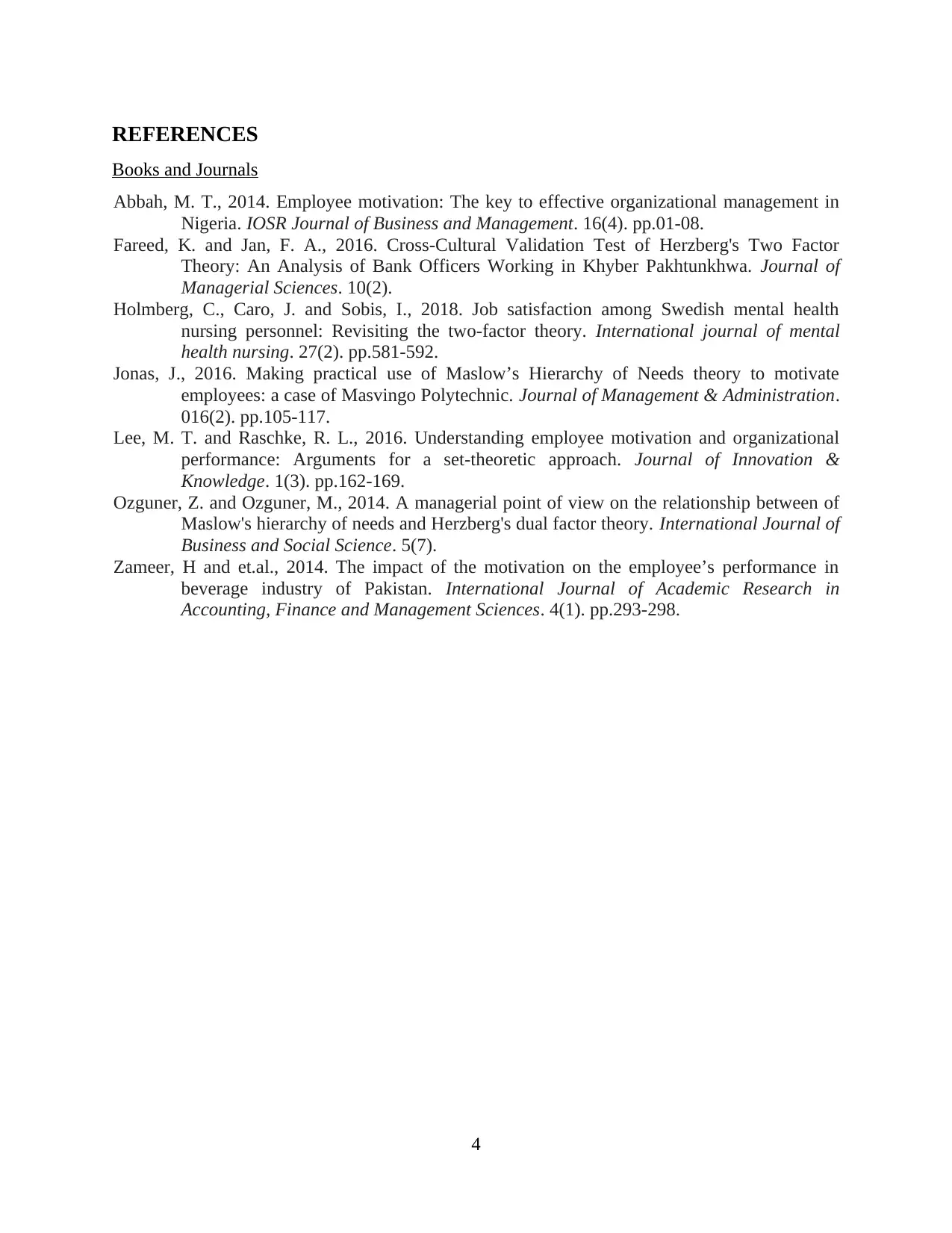
REFERENCES
Books and Journals
Abbah, M. T., 2014. Employee motivation: The key to effective organizational management in
Nigeria. IOSR Journal of Business and Management. 16(4). pp.01-08.
Fareed, K. and Jan, F. A., 2016. Cross-Cultural Validation Test of Herzberg's Two Factor
Theory: An Analysis of Bank Officers Working in Khyber Pakhtunkhwa. Journal of
Managerial Sciences. 10(2).
Holmberg, C., Caro, J. and Sobis, I., 2018. Job satisfaction among Swedish mental health
nursing personnel: Revisiting the two‐factor theory. International journal of mental
health nursing. 27(2). pp.581-592.
Jonas, J., 2016. Making practical use of Maslow’s Hierarchy of Needs theory to motivate
employees: a case of Masvingo Polytechnic. Journal of Management & Administration.
016(2). pp.105-117.
Lee, M. T. and Raschke, R. L., 2016. Understanding employee motivation and organizational
performance: Arguments for a set-theoretic approach. Journal of Innovation &
Knowledge. 1(3). pp.162-169.
Ozguner, Z. and Ozguner, M., 2014. A managerial point of view on the relationship between of
Maslow's hierarchy of needs and Herzberg's dual factor theory. International Journal of
Business and Social Science. 5(7).
Zameer, H and et.al., 2014. The impact of the motivation on the employee’s performance in
beverage industry of Pakistan. International Journal of Academic Research in
Accounting, Finance and Management Sciences. 4(1). pp.293-298.
4
Books and Journals
Abbah, M. T., 2014. Employee motivation: The key to effective organizational management in
Nigeria. IOSR Journal of Business and Management. 16(4). pp.01-08.
Fareed, K. and Jan, F. A., 2016. Cross-Cultural Validation Test of Herzberg's Two Factor
Theory: An Analysis of Bank Officers Working in Khyber Pakhtunkhwa. Journal of
Managerial Sciences. 10(2).
Holmberg, C., Caro, J. and Sobis, I., 2018. Job satisfaction among Swedish mental health
nursing personnel: Revisiting the two‐factor theory. International journal of mental
health nursing. 27(2). pp.581-592.
Jonas, J., 2016. Making practical use of Maslow’s Hierarchy of Needs theory to motivate
employees: a case of Masvingo Polytechnic. Journal of Management & Administration.
016(2). pp.105-117.
Lee, M. T. and Raschke, R. L., 2016. Understanding employee motivation and organizational
performance: Arguments for a set-theoretic approach. Journal of Innovation &
Knowledge. 1(3). pp.162-169.
Ozguner, Z. and Ozguner, M., 2014. A managerial point of view on the relationship between of
Maslow's hierarchy of needs and Herzberg's dual factor theory. International Journal of
Business and Social Science. 5(7).
Zameer, H and et.al., 2014. The impact of the motivation on the employee’s performance in
beverage industry of Pakistan. International Journal of Academic Research in
Accounting, Finance and Management Sciences. 4(1). pp.293-298.
4
1 out of 6
Related Documents
Your All-in-One AI-Powered Toolkit for Academic Success.
+13062052269
info@desklib.com
Available 24*7 on WhatsApp / Email
![[object Object]](/_next/static/media/star-bottom.7253800d.svg)
Unlock your academic potential
© 2024 | Zucol Services PVT LTD | All rights reserved.





